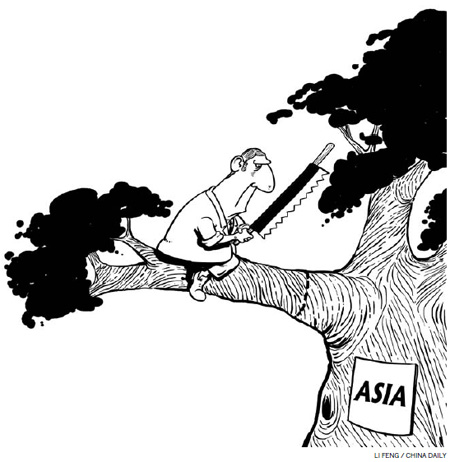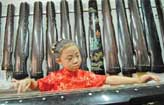Op-Ed Contributors
The changing reality in Asia Pacific
Updated: 2011-08-02 07:53
By Wang Yusheng (China Daily)

Some international media outlets have been sensationalizing the "Asia-minus-one" concept, claiming that an "invisible alliance" is forming among countries neighboring China to prevent a Chinese "invasion". They have even held a debate on the issue and raised a series of questions such as "why" and "how China should respond" and what role the United States has played and should play in the region.
The emergence of the concepts of "Asia-minus-one" and "invisible alliance" may appear to be new. But they are only a variant of the "Asian NATO" platitudes under new circumstances.
We live in times when accelerating development and globalization have changed all aspects of international and geopolitical relations. Sino-US relationship is not similar to that between the US and the erstwhile Soviet Union during the Cold War. Besides, the impact of China's harmonious diplomatic policy is such that relations between China and its neighbors are getting better, as is evident from a US mainstream media report saying that "no country wants to ally with the US against China".
China and member states of the Association of Southeast Asian Nations (ASEAN) attach great importance to friendly cooperation. This makes the "Asia-minus-one" alliance against China at best imaginary.
The reason for calling it a "variant" of the "Asian NATO" is that such a concept can only be the product of Cold War mentality with the overt purpose of containing China's rise in one way or another. But the Cold War is history and no policy linked to it can work in today's world.
The two terms, "Asian NATO" and the Cold War, have not appeared coincidentally. Parties involved have their own wishful thinking.
As for the US, first, it wants to create an atmosphere which will make "the US is indispensable" and demonstrate its "second-to-none" strategy. Second, it hopes to strengthen its control over its allies such as Japan and the Republic of Korea and prevent them from deviating from the alliance, which they have tried to do recently. Third, the US wants to prevent ASEAN member states from getting too close to China, because that can marginalize Washington. And last, it provides covert moderate support to small countries to contest with China by using the "China threat" theory to sow seeds of discord.
For example, the US media tend to play down or ignore news of almost all positive links and associations between China and its neighbors, and sensationalize trivial frictions, magnify occasional discords and exaggerate or distort events to compel some countries to depend on the US to "contest China". This is best reflected in a statement that US Secretary of State Hillary Clinton made during her recent visit to India urging India to not only "look East", but also make efforts to extend its leadership over the Asia-Pacific region.
Japan, on its part, has not reconciled to the fact that China has surpassed it as the second largest economy in terms of GDP and is worried about the possibility of the Asia-Pacific region being jointly "controlled" by China and the US in the future. Also, influenced by Cold War mentality, right-wing forces in Japan are trying to find a way to deal with China and advocate that Japan should ally with ASEAN countries to check China's "maritime invasion". Japan has established an "excellent" tacit cooperation - the so-called invisible alliance with the US - to promote its status and weaken that of China.
Other Asian countries such as Vietnam and the Philippines have to some extent opted to depend on the US to take on China and raise their bargaining chips. People with malicious intentions from some countries even try to stir up trouble between Beijing and Washington using the pretext that China wants to replace US in Asia Pacific.
Though such wishful thinking is not beyond understanding, it is unilateral and unrealistic.
The US is still powerful but is no longer a superpower in the strict sense of term, and thus it cannot act according to its will. Besides, the US needs the support of and cooperation from China. After President Hu Jintao's visit to the US earlier this year, the new positioning of Sino-US relationship (which is of mutual respect and cooperation, and a win-win partnership) and the establishment of the bilateral negotiation mechanism on Asia-Pacific affairs, Washington should exercise restraint in its policies if it understands the changing times and keeps its promise.
More importantly, China has unswervingly pursued the policy of independence and peaceful development, and developed good-neighborly and friendly relations with countries around it. Since China's comprehensive national power has grown considerably, the country's leadership in recent years has made effective efforts to build a "harmonious neighborhood".
In dealing with maritime rights and interests, China's policy of protection of rights is firm but very restrained and matter of fact, for it hopes to resolve the issues through friendly and peaceful negotiations and dialogues with disputing countries.
If relevant countries consider it to be China's weakness or perceive it as fear of the US and hope to take on China by joining the "invisible alliance", then they would be misreading the situation and misjudging Beijing's position and policies. Such actions would not only go against peace and stability in the Asia-Pacific region, but also harm their fundamental interests.
The author is executive director of the Strategy Research Center of China International Studies Research Fund and a former senior APEC official.
(China Daily 08/02/2011 page9)

Specials

Carrier set for maiden voyage
China is refitting an obsolete aircraft carrier bought from Ukraine for research and training purposes.
 Photo
Photo  Video
Video

Pulling heart strings
The 5,000-year-old guqin holds a special place for both european and Chinese music lovers

Fit to a tea
Sixth-generation member of tea family brews up new ideas to modernize a time-honored business